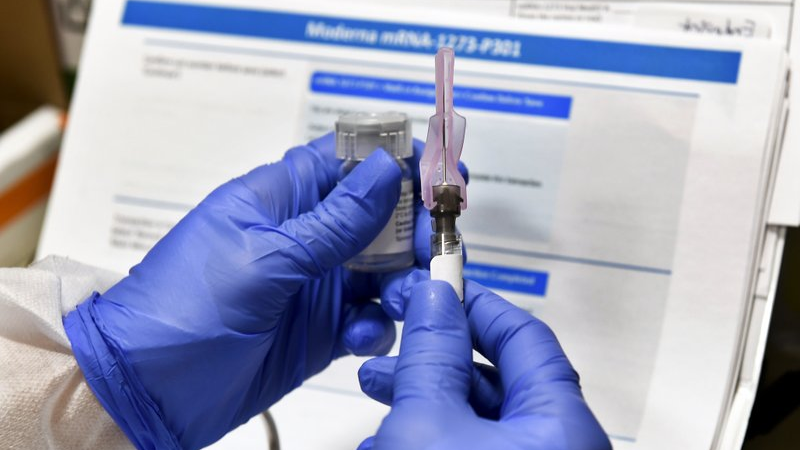
Nurse Kathe Olmstead prepares a shot that is part of a possible COVID-19 vaccine, developed by the National Institutes of Health and Moderna. /AP
Nurse Kathe Olmstead prepares a shot that is part of a possible COVID-19 vaccine, developed by the National Institutes of Health and Moderna. /AP
U.S. biotechnology company Moderna on Monday said its COVID-19 vaccine appears to be 94.5% effective, according to preliminary data from the company's ongoing study.
A week ago, competitor Pfizer Inc. announced its COVID-19 vaccine appeared similarly effective – news that puts both companies on track to seek permission within weeks for emergency use in the U.S.
Dr. Stephen Hoge, Moderna's president, welcomed the "really important milestone" but said having similar results from two different companies is what's most reassuring.
"It won't be Moderna alone that solves this problem. It's going to require many vaccines" to meet the global demand, he added.
A vaccine can't come fast enough, as virus cases topped 11 million in the U.S. over the weekend – 1 million of them recorded in just the past week. The pandemic has killed more than 1.3 million people worldwide, more than 245,000 of them in the U.S.
Cautious optimism over vaccines
Moderna's vaccine, created with the National Institutes of Health, is being studied in 30,000 volunteers who received either the real vaccination or a dummy shot. On Sunday, an independent monitoring board broke the code to examine 95 infections that were recorded starting two weeks after volunteers' second dose – and discovered all but five illnesses occurred in participants who got the placebo.
The study is continuing, and Moderna acknowledged the protection rate might change as more COVID-19 infections are detected and added to the calculations. Also, it's too soon to know how long protection lasts. Both cautions apply to Pfizer's vaccine as well.
The main side effects were fatigue, muscle aches and injection-site pain after the vaccine's second dose, at rates that Hoge characterized as more common than with flu shots but on par with others such as shingles vaccine.
"These effects are what we would expect with a vaccine that is working and inducing a good immune response," Prof Peter Openshaw, from Imperial College London, told BBC News.
Strong results a surprise
Both Moderna's shots and the Pfizer-BioNTech candidate are so-called mRNA vaccines, a brand-new technology. They aren't made with the coronavirus itself, meaning there's no chance anyone could catch it from the shots.
Instead, the vaccine contains a piece of genetic code that trains the immune system to recognize the spiked protein on the surface of the virus.
The strong results were a surprise. Scientists have warned for months that any COVID-19 shot may be only as good as flu vaccines, which are about 50 percent effective.
Another steep challenge: distributing doses that must be kept very cold. Both the Moderna and Pfizer shots are frozen but at different temperatures. Moderna announced Monday that once thawed, its doses can last longer in a refrigerator than initially thought, up to 30 days. Pfizer's shots require long-term storage at ultra-cold temperatures.
(With input from AP)

